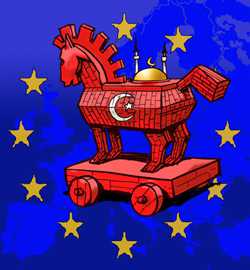The EU’s negotiations, or rather non-negotiations with Turkey, turned out to be tricks, jeopardising the EU’s reputation and respectability. What the Germans and others don’t seem to realise is that they expect more from Turkey than they do from themselves, writes Dr. Petra Erler.
Dr. Petra Erler is managing director of the European Experience Company GmbH in Potsdam and served as Head of Cabinet of the former EU Commissioner Günter Verheugen in Brussels.
This article was translated from German.
“In the enlargement negotiations, Chapter 19 on social policy deals with all questions regarding the adoption of EU law by applicant countries in this area, ensuring that future member states fully comply with Community law.
For several years now, the progress of negotiations has clearly depended on applicant countries having to meet so-called opening benchmarks, in other words specific requirements formulated by the EU.
Anyone wishing to delay the negotiations or set the bar extremely high has to get creative with regard to these opening benchmarks, as in the case of Turkey and Chapter 19.
Unlike other chapters, this chapter is not being blocked for political reasons. Opening this chapter would thus send a strong signal of the willingness of both sides to advance Turkey’s accession process. However, it is precisely this willingness which seems to be lacking.
Trade union rights
In chapter 19, the EU requires Turkey to comply with ‘EU standards’ as well as conventions no. 87 and 98 of the International Labour Organization (ILO) before accession talks can begin. These conventions include important trade union rights concerning, inter alia, the right to organise and the right to strike.
At first glance, one is tempted to genuinely thank the Commission and the member states leading the negotiations for addressing this important issue and thus also influencing the situation in Turkey for the better. After all, only a minority of Turkish workers are organised in trade unions.
On second look, however, one begins to wonder what exactly is meant by “EU standards”. A closer look at the Commission’s screening report on Turkey shows that this actually refers to articles 5 and 6 of the European Social Charter, which have not yet been ratified by Turkey.
Sobering comparison with EU member states
Anyone who concludes from this that all EU members have ratified the articles mentioned would be mistaken. Spain and Germany have issued statements on this. Four other member states have not made commitments to all sections of these articles.
There’s also the issue of the revised European Social Charter which was implemented in Turkish national law in 2007. Although this revised Charter has long been signed by ten EU member states including Germany, it has not yet been ratified, let alone implemented.
With regard to the ILO conventions, it could be argued that once a state has entered into international obligations it must fully comply with these obligations. One has to agree with that, and the ILO has indeed criticised Turkey for the poor implementation of the conventions mentioned above.
ILO criticises right to strike in Germany
However, the ILO has expressed serious criticism as to the German understanding of who is allowed to strike and who is not. So what are the factors that define an EU standard? Moreover, why is this addressed under the section “adoption of the acquis” rather than in the part covering the political criteria? And why is the full implementation of these important rights considered the basis of the negotiations rather than the result?
Don’t the Germans and others realise that they demand more from Turkey than they do from themselves? Or is simply that no one bothered to address the issue, relying blindly on the Commission, which is probably more than willing to consider the enforcement of international treaties as Community law. Did all this happen on purpose? Was it designed as a provocation?
As it happens, Turkey did not complain and complied with the EU requirements. The legislative provisions were critically revised and updated in 2012 by the social partners. By consensus.
And once again Brussels is not satisfied.
It is a lesson for all those obliged to conduct negotiations they do not wish to have or doing so without paying attention. No one seems to care that such tricks jeopardise the EU’s reputation and respectability.
via The EU’s non-negotiations with Turkey | EurActiv.


Leave a Reply